牛津英语七年级上期各单元知识点归纳
- 格式:doc
- 大小:64.00 KB
- 文档页数:5
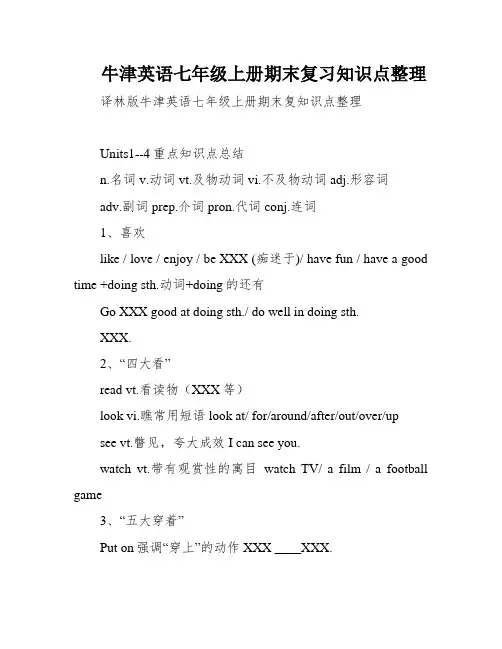
牛津英语七年级上册期末复习知识点整理译林版牛津英语七年级上册期末复知识点整理Units1--4重点知识点总结n.名词v.动词vt.及物动词vi.不及物动词adj.形容词adv.副词prep.介词pron.代词conj.连词1、喜欢like / love / enjoy / be XXX (痴迷于)/ have fun / have a good time +doing sth.动词+doing的还有Go XXX good at doing sth./ do well in doing sth.XXX.2、“四大看”read vt.看读物(XXX等)look vi.瞧常用短语look at/ for/around/after/out/over/upsee vt.瞥见,夸大成效I can see you.watch vt.带有观赏性的寓目watch TV/ a film / a football game3、“五大穿着”Put on强调“穿上”的动作XXX ____XXX.Wear强调“穿着”的状态;进行时态表示暂时的情况XXX glassesDress(1)dress sb.(2) dress oneself(3) dress up as(4) get dressedIn(穿戴)后接颜色(或衣服),表示状态look!XXX is_____a XXX后接人指衣服穿在某人身上看出区别来。
The red coat looks nice on you.4、“四大花费”XXX:sb.(人)+ XXX.sb.(人)+ spend +工夫/款项+(in) XXX.pay:sb.(人)+pay +款项+for sth.cost:sth.(物)+ cost + sb.+金钱XXX时间XXX:it XXX sb. +时间+ to do sth.5、“三大地点副词”Home / there /here前不加任何的介词welcome home / come here / go there6、“三大使役动词”Make sb. do sth./ have sb. do sth. / let sb.do sth.7、晤面打号召用语(1)Nice to meet you . (2) Glad to meet you . (3) How are you ? (4) How are you doing ?(5)How is it going ?(6)How is everything going?(7) What’s up?8、基数词+year(s)+old透露表现“…岁”发问用“how old”名词性短语数词-year-old也透露表现年岁,但其为描述词性短语“前有冠词后著名(词)”Eg. Helen is 11 years old = Helen is an 11-year-old girl.9、Let’s与let us的区分Let’s do sth.指包括听者(对方)和说者(我们)都在内,表示建议Let us do XXX.指“让(允许)我们做某事”而听者(对方)不做,只有“我们”做10、play+the+乐器类名词e.g. Play the pianoPlay +球类活动play+ football / play cards / play chess11、She comes from Shanghai= She is from Shanghai .注:如何提问Shanghai及如何改一般疑问句12、be good at =do well in = be clever at = study sth. wellBe good at (反) be bad atdo well in (反) be poor in13、介词over的用法(1)”在…正上方” There is a bridge over the river.(2)”超出”A plane flies over the house(3)”跨越” There are over 20 boys in this class.(4)”竣事” Class is over! / Game is over.14、every one与everyone辨析区分(1)Every one能够与of连用,而everyone却不克不及与of连用Eg.every one of the children XXX.(2) XXX只指人=everybody而every one既指人又可指物配合点:谓语动词都要用“三单”15、family的用法:“家庭”作为团体谓语动词用“单数”He has a big family.“家人”夸大成员,是复数寄义,谓语动词用“真相” My family are at home.拓展:个人名词有people、class、police、sheep、deer、furniture等16、all/ both/ each/every/neither/ either的用法all(1)三者或三者以上“全部、都”(2)all + the +名词(all the afternoon = the whole afternoon)(3)all放在行为动词前,名词前;be动词后(4) all of +宾格/名词复数Both(1)二者都(2)后可跟of +宾格/名词复数Both sides of XXX指两个或两个以上“每个”个别Each side of the XXX.Every指良多人或事物的“部分”后接名词单数Every student is here .一切人都在。
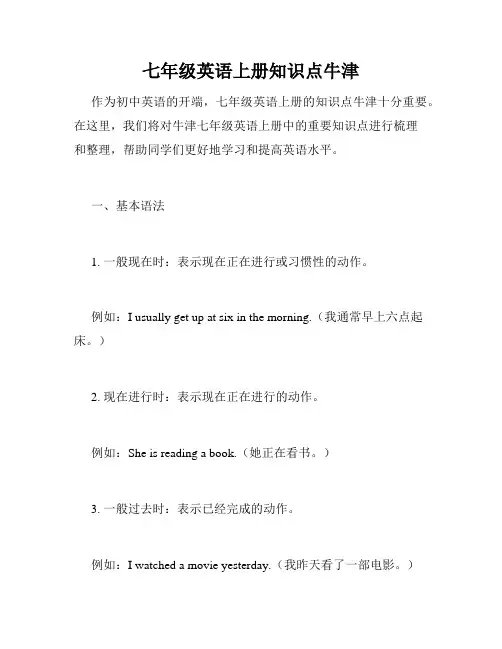
七年级英语上册知识点牛津作为初中英语的开端,七年级英语上册的知识点牛津十分重要。
在这里,我们将对牛津七年级英语上册中的重要知识点进行梳理和整理,帮助同学们更好地学习和提高英语水平。
一、基本语法1. 一般现在时:表示现在正在进行或习惯性的动作。
例如:I usually get up at six in the morning.(我通常早上六点起床。
)2. 现在进行时:表示现在正在进行的动作。
例如:She is reading a book.(她正在看书。
)3. 一般过去时:表示已经完成的动作。
例如:I watched a movie yesterday.(我昨天看了一部电影。
)4. 现在完成时:表示已经完成的动作对现在造成的影响。
例如:I have finished my homework.(我已经完成了我的作业。
)5. 现在完成进行时:表示从过去某时开始一直到现在正在进行的动作。
例如:I have been studying English for two hours.(我已经学了两个小时的英语。
)二、基本词汇1. 数字:one, two, three, four, five, six, seven, eight, nine, ten2. 人称代词和物主代词:I, you, he, she, it, we, they, me, you, him, her, it, us, them3. 颜色:red, blue, green, yellow, black, white4. 学科:math, science, history, geography, music, art, PE三、基本句型1. 陈述句:主语 + 谓语 + 宾语例如:I love English.(我爱英语。
)2. 疑问句:疑问词 + 动词 + 主语 + 其他信息例如:What is your name?(你叫什么名字?)3. 否定句:主语 + 动词 + not + 宾语例如:I do not like math.(我不喜欢数学。
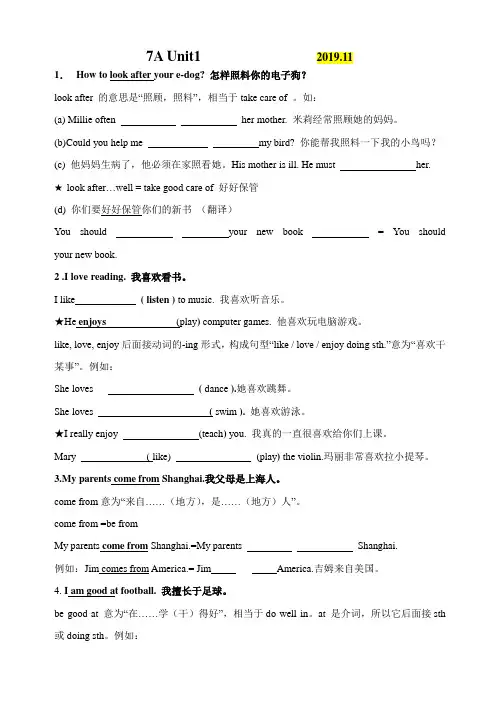
7A Unit1 2019.111.How to look after your e-dog? 怎样照料你的电子狗?look after 的意思是“照顾,照料”,相当于take care of 。
如:(a) Millie often her mother. 米莉经常照顾她的妈妈。
(b)Could you help me my bird? 你能帮我照料一下我的小鸟吗?(c) 他妈妈生病了,他必须在家照看她。
His mother is ill. He must her.★ look after…well = take good care of 好好保管(d) 你们要好好保管你们的新书(翻译)You should your new book = You should your new book.2 .I love reading. 我喜欢看书。
I like ( listen ) to music. 我喜欢听音乐。
★He enjoys(play) computer games. 他喜欢玩电脑游戏。
like, love, enjoy后面接动词的-ing形式,构成句型“like / love / enjoy doing sth.”意为“喜欢干某事”。
例如:She loves ( dance ).她喜欢跳舞。
She loves( swim ).她喜欢游泳。
★I really enjoy (teach) you. 我真的一直很喜欢给你们上课。
Mary ( like) (play) the violin.玛丽非常喜欢拉小提琴。
3.My parents come from Shanghai.我父母是上海人。
come from意为“来自……(地方),是……(地方)人”。
come from =be fromMy parents come from Shanghai.=My parents Shanghai.例如:Jim comes from America.= Jim America.吉姆来自美国。
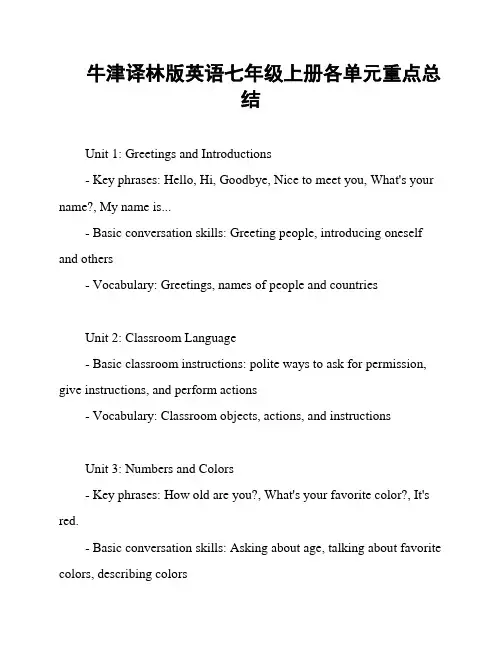
牛津译林版英语七年级上册各单元重点总结Unit 1: Greetings and Introductions- Key phrases: Hello, Hi, Goodbye, Nice to meet you, What's your name?, My name is...- Basic conversation skills: Greeting people, introducing oneself and others- Vocabulary: Greetings, names of people and countriesUnit 2: Classroom Language- Basic classroom instructions: polite ways to ask for permission, give instructions, and perform actions- Vocabulary: Classroom objects, actions, and instructionsUnit 3: Numbers and Colors- Key phrases: How old are you?, What's your favorite color?, It's red.- Basic conversation skills: Asking about age, talking about favorite colors, describing colors- Vocabulary: Numbers, colors, ageUnit 4: My Family- Key phrases: How many people are there in your family?, This is my mother/father/sister/brother.- Basic conversation skills: Talking about family members, describing family relationships- Vocabulary: Family members, possessive pronounsUnit 5: My School- Key phrases: What's your favorite subject?, Do you like...?, Yes, I do. / No, I don't.- Basic conversation skills: Talking about school subjects, expressing likes and dislikes- Vocabulary: School subjects, opinionsUnit 6: My Friends- Key phrases: Who's your best friend?, What does he/she look like?, He/She is...- Basic conversation skills: Talking about friends, describing appearance- Vocabulary: Words to describe people's physical appearanceUnit 7: Free Time Activities- Key phrases: What do you do in your free time?, I like playing football / reading books / listening to music.- Basic conversation skills: Talking about hobbies and free time activities- Vocabulary: Hobbies and leisure activitiesUnit 8: Daily Routines- Key phrases: What time do you get up/go to bed/eat breakfast?, I get up at.../Go to bed at.../Eat breakfast at...- Basic conversation skills: Talking about daily routines and telling the time- Vocabulary: Daily activities, timeUnit 9: Food and Drinks- Key phrases: Do you like...?, Yes, I do. / No, I don't., Can I have some...?, Sure, here you are.- Basic conversation skills: Talking about food preferences, ordering food and drinks- Vocabulary: Food and drinks, likes and dislikesUnit 10: Clothes- Key phrases: What are you wearing?, I'm wearing a T-shirt/trousers/skirt/shoes, etc.- Basic conversation skills: Talking about clothes and describing what someone is wearing- Vocabulary: Clothing itemsUnit 11: Weather- Key phrases: What's the weather like today?, It'ssunny/rainy/cloudy/windy, etc.- Basic conversation skills: Talking about the weather and describing weather conditions- Vocabulary: Weather words and phrasesUnit 12: Holidays and Celebrations- Key phrases: When is...?, It's on..., What do people do on...?, People usually...- Basic conversation skills: Talking about holidays and celebrations, discussing traditions and customs- Vocabulary: Holidays and celebrations, activities以上是牛津译林版英语七年级上册各单元的重点总结,希望对您有所帮助。
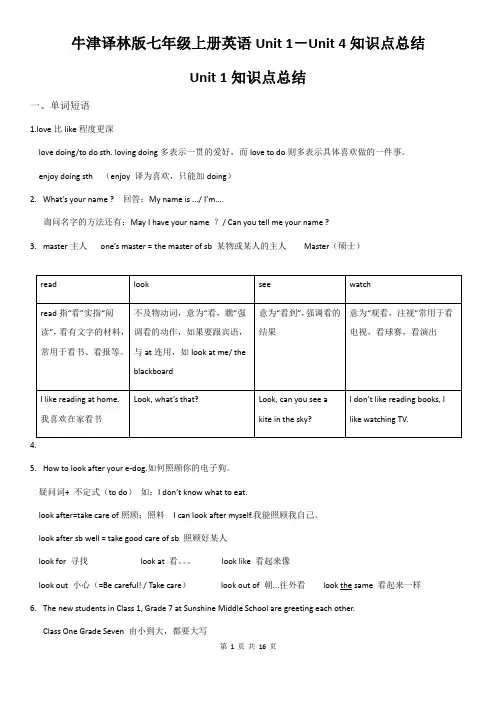
牛津译林版七年级上册英语Unit 1-Unit 4知识点总结Unit 1知识点总结一、单词短语1.love比like程度更深love doing/to do sth. loving doing多表示一贯的爱好,而love to do则多表示具体喜欢做的一件事。
enjoy doing sth (enjoy 译为喜欢,只能加doing)2.What's your name ? 回答:My name is .../ I’m....询问名字的方法还有:May I have your name ?/ Can you tell me your name ?3.master主人one’s master = the master of sb 某物或某人的主人Master(硕士)4.5.How to look after your e-dog.如何照顾你的电子狗。
疑问词+ 不定式(to do)如:I don’t know what to eat.look after=take care of照顾;照料I can look after myself.我能照顾我自己。
look after sb well = take good care of sb 照顾好某人look for 寻找look at 看。
look like 看起来像look out 小心(=Be careful! / Take care)look out of 朝...往外看look the same 看起来一样6.The new students in Class 1, Grade 7 at Sunshine Middle School are greeting each other.Class One Grade Seven 由小到大,都要大写用法相同的还有number ,lesson,unit,group,roomI’m in Grade 7.(对划线部分提问)What/ Which grade are you in?Our school has six grades.我们学校有6个年级。
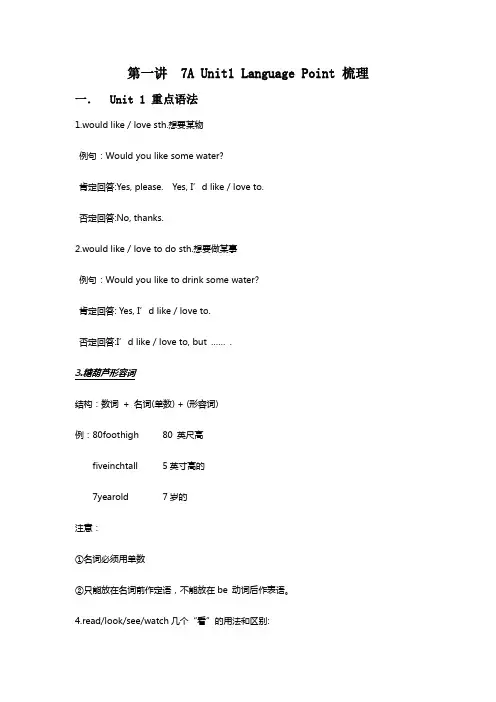
第一讲 7A Unit1 Language Point 梳理一.Unit 1 重点语法1.would like / love sth.想要某物例句:Would you like some water?肯定回答:Yes, please. Yes, I’d like / love to.否定回答:No, thanks.2.would like / love to do sth.想要做某事例句:Would you like to drink some water?肯定回答: Yes, I’d like / love to.否定回答:I’d like / love to, but …… .3.糖葫芦形容词结构:数词+ 名词(单数) + (形容词)例:80foothigh 80 英尺高fiveinchtall 5英寸高的7yearold 7岁的注意:①名词必须用单数②只能放在名词前作定语,不能放在be 动词后作表语。
4.read/look/see/watch几个“看”的用法和区别:look 强调看的动作①系动词。
译作看起来,后接形容词。
She looks happy.②不及物动词。
译作看,词组:look at…,用副词修饰。
Tom looked at me angrily.see 及物动词,译作看到,无进行时态,强调看的结果。
watch 及物动词,译作观看,注视。
强调观看正在进行中的,发生变化的活动过程,常用于看电视、看球赛、看演出等。
read 及物动词,译作阅读。
强调看文字内容的东西,常用于看书、看报纸、看杂志等。
5.疑问代词what、which、who 及疑问副词how、when 、where可以和动词不定式连用。
what to do 做什么which to do 做哪个who to do 如何做how to do 谁做when to do 什么时候做where to do 在哪里做6.“疑问词+ to do” 结构经常放在know,learn,see ,ask等动词后做宾语。
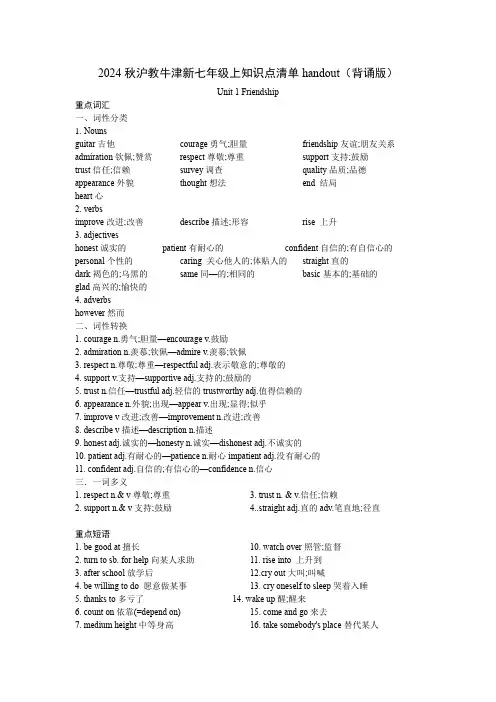
2024秋沪教牛津新七年级上知识点清单handout(背诵版)Unit 1 Friendship重点词汇一、词性分类1.Nounsguitar吉他courage勇气;胆量friendship友谊;朋友关系admiration钦佩;赞赏respect尊敬;尊重support支持;鼓励trust信任;信赖survey调查quality品质;品德appearance外貌thought想法end 结局heart心2. verbsimprove改进;改善describe描述;形容rise 上升3. adjectiveshonest诚实的patient有耐心的confident自信的;有自信心的personal个性的caring 关心他人的;体贴人的straight直的dark褐色的;乌黑的same同—的;相同的basic基本的;基础的glad高兴的;愉快的4. adverbshowever然而二、词性转换1. courage n.勇气;胆量—encourage v.鼓励2. admiration n.羡慕;钦佩—admire v.羡慕;钦佩3. respect n.尊敬;尊重—respectful adj.表示敬意的;尊敬的4. support v.支持—supportive adj.支持的;鼓励的5. trust n.信任—trustful adj.轻信的trustworthy adj.值得信赖的6. appearance n.外貌;出现—appear v.出现;显得;似乎7. improve v改进;改善—improvement n.改进;改善8. describe v描述—description n.描述9. honest adj.诚实的—honesty n.诚实—dishonest adj.不诚实的10. patient adj.有耐心的—patience n.耐心impatient adj.没有耐心的11. confident adj.自信的;有信心的—confidence n.信心三.一词多义1. respect n.& v尊敬;尊重 3. trust n. & v.信任;信赖2. support n.& v支持;鼓励 4..straight adj.直的adv.笔直地;径直重点短语1. be good at擅长10. watch over照管;监督2. turn to sb. for help向某人求助11. rise into 上升到3. after school放学后12.cry out大叫;叫喊4. be willing to do 愿意做某事13. cry oneself to sleep哭着入睡5. thanks to多亏了14. wake up醒;醒来6. count on依靠(=depend on)15. come and go来去7. medium height中等身高16. take somebody's place替代某人8. modern dance现代舞17. come along 出现9. take care of照顾(= look after / care for)核心句式1. What do you like doing?你喜欢做什么?2.Li Hua is helpful and patient.李华乐于助人且有耐心。
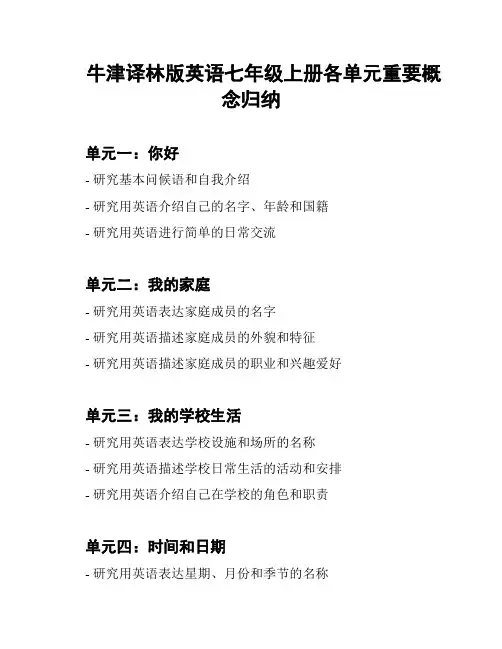
牛津译林版英语七年级上册各单元重要概
念归纳
单元一:你好
- 研究基本问候语和自我介绍
- 研究用英语介绍自己的名字、年龄和国籍
- 研究用英语进行简单的日常交流
单元二:我的家庭
- 研究用英语表达家庭成员的名字
- 研究用英语描述家庭成员的外貌和特征
- 研究用英语描述家庭成员的职业和兴趣爱好
单元三:我的学校生活
- 研究用英语表达学校设施和场所的名称
- 研究用英语描述学校日常生活的活动和安排
- 研究用英语介绍自己在学校的角色和职责
单元四:时间和日期
- 研究用英语表达星期、月份和季节的名称
- 研究用英语询问和回答关于时间和日期的问题- 研究用英语描述日常活动的时间和顺序
单元五:我的日常生活
- 研究用英语描述自己的日常活动和作息时间- 研究用英语询问和回答关于日常生活的问题- 研究用英语描述喜欢的食物、运动和爱好
单元六:购物
- 研究用英语表达购物场所和商品的名称
- 研究用英语询问和回答关于购物的问题
- 研究用英语描述购物时的交流和讨价还价
单元七:体育运动
- 研究用英语表达不同的体育运动项目
- 研究用英语询问和回答关于体育运动的问题- 研究用英语描述自己参与过的体育运动经历
单元八:健康和饮食
- 研究用英语表达健康和饮食方面的词汇
- 研究用英语询问和回答关于健康和饮食的问题
- 研究用英语描述自己的饮食偏好和健康惯
以上为《牛津译林版英语七年级上册》各单元的重要概念归纳。
*Note:* *此文档为简要概述,以帮助读者快速了解各单元内容,具体细节可参考教材。
*。
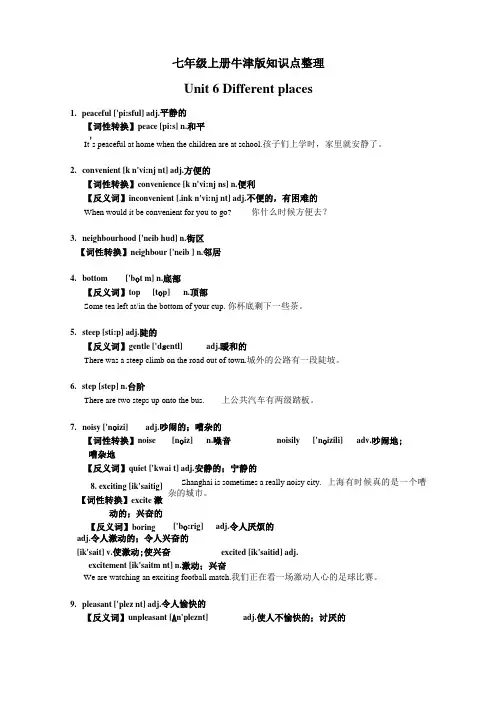
七年级上册牛津版知识点整理Unit 6 Different places1. peaceful ['pi:sful] adj.平静的【词性转换】peace [pi:s] n.和平It ’s peaceful at home when the children are at school.孩子们上学时,家里就安静了。
2. convenient [k n'vi:nj nt] adj.方便的【词性转换】convenience [k n'vi:nj ns] n.便利【反义词】inconvenient [.ink n'vi:nj nt] adj.不便的,有困难的When would it be convenient for you to go? 你什么时候方便去?3. neighbourhood ['neib hud] n.街区【词性转换】neighbour ['neib ] n.邻居4. bottom['b o t m] n.底部【反义词】top[t o p]n.顶部Some tea left at/in the bottom of your cup. 你杯底剩下一些茶。
5. steep [sti:p] adj.陡的【反义词】gentle ['d s entl] adj.暖和的There was a steep climb on the road out of town.城外的公路有一段陡坡。
6. step [step] n.台阶There are two steps up onto the bus. 上公共汽车有两级踏板。
7. noisy ['n o izi]adj.吵闹的;嘈杂的【词性转换】noise [n o iz]n.噪音noisily['n o izili]adv.吵闹地;嘈杂地【反义词】quiet ['kwai t] adj.安静的;宁静的Shanghai is sometimes a really noisy city. 上海有时候真的是一个嘈杂的城市。
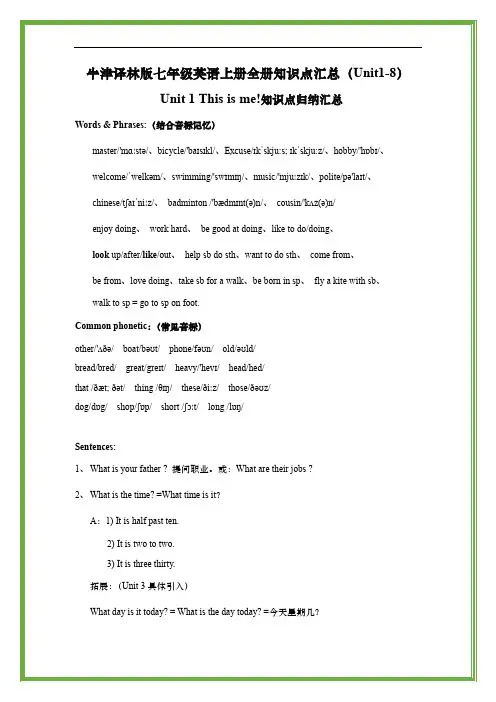
牛津译林版七年级英语上册全册知识点汇总(Unit1-8)Unit 1 This is me!知识点归纳汇总Words & Phrases:(结合音标记忆)master/'mɑːstə/、bicycle/'baɪsɪkl/、Excuse/ɪkˈskju:s; ɪkˈskju:z/、hobby/'hɒbɪ/、welcome/ˈwelkəm/、swimming/'swɪmɪŋ/、music/'mjuːzɪk/、polite/pə'laɪt/、chinese/tʃaɪˈniːz/、badminton /'bædmɪnt(ə)n/、cousin/'kʌz(ə)n/enjoy doing、work hard、be good at doing、like to do/doing、look up/after/like/out、help sb do sth、want to do sth、come from、be from、love doing、take sb for a walk、be born in sp、fly a kite with sb、walk to sp = go to sp on foot.Common phonetic:(常见音标)other/'ʌðə/ boat/bəʊt/ phone/fəʊn/ old/əʊld/bread/bred/ great/greɪt/ heavy/'hevɪ/ head/hed/that /ðæt; ðət/ thing /θɪŋ/ these/ðiːz/ those/ðəʊz/dog/dɒg/ shop/ʃɒp/ short /ʃɔːt/ long /lɒŋ/Sentences:1、What is your father ? 提问职业。
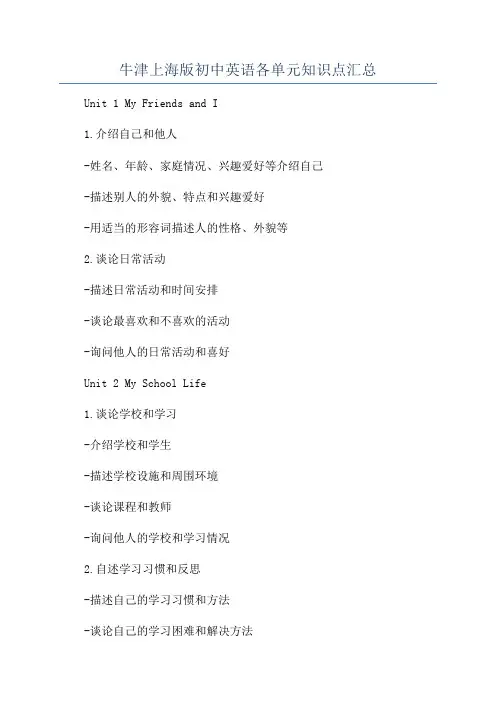
牛津上海版初中英语各单元知识点汇总Unit 1 My Friends and I1.介绍自己和他人-姓名、年龄、家庭情况、兴趣爱好等介绍自己-描述别人的外貌、特点和兴趣爱好-用适当的形容词描述人的性格、外貌等2.谈论日常活动-描述日常活动和时间安排-谈论最喜欢和不喜欢的活动-询问他人的日常活动和喜好Unit 2 My School Life1.谈论学校和学习-介绍学校和学生-描述学校设施和周围环境-谈论课程和教师-询问他人的学校和学习情况2.自述学习习惯和反思-描述自己的学习习惯和方法-谈论自己的学习困难和解决方法-做学习计划和目标-给他人学习建议和鼓励Unit 3 At Home1.描述家庭和住所-描述自己的家庭成员和住所-谈论家庭活动和责任分工-询问他人的家庭和住所情况2.谈论房间和家居用品-描述自己的房间和家居用品-谈论喜欢和不喜欢的房间和家具-询问他人的房间和家居用品情况Unit 4 Out and About1.指路和交通方式-描述如何去其中一地方-描述不同的交通方式-询问他人如何到达其中一地方2.谈论购物和交易-描述购物的地点和方式-询问商品的价格和数量-谈论交易的方式和经验Unit 5 Food and Drinks1.描述食物和饮品-描述不同种类的食物和饮品-询问食物和饮品的口味和偏好-谈论不同的饮食习惯和习惯-谈论对食物和饮品的看法和建议2.谈论饮食习惯和健康-描述自己的饮食习惯和健康问题-谈论健康生活方式和饮食习惯Unit 6 Hobbies1.介绍兴趣爱好和活动-描述自己和他人的兴趣爱好和活动-询问他人的兴趣爱好和活动2.谈论喜欢的体育运动-谈论自己喜欢的体育运动和运动员-询问他人喜欢的体育运动和运动员-谈论体育运动的好处和意义Unit 7 Holidays1.描述假期活动和旅行-描述过去和将来的假期活动-描述旅行的目的地、交通方式和活动-询问他人的假期活动和旅行计划2.谈论文化活动和习俗-描述不同的文化活动和习俗-谈论自己参与过的文化活动和习俗-询问他人的文化活动和习俗Unit 8 In Town1.描述城市景点和地标-描述自己所在的城市景点和地标-谈论旅游的经历和感受-询问他人所在城市的景点和地标2.指导他人如何参观和游玩-描述参观和游玩的流程和方式-给他人参观和游玩的建议和指导-询问他人参观和游玩的经验和意见Unit 9 Weather1.描述天气和季节-描述不同季节的天气和气候-谈论喜欢和不喜欢的天气和季节-询问他人所在地和将要去的地方的天气情况2.谈论天灾和自然现象-描述不同的天灾和自然现象-谈论对天灾和自然现象的了解和防范Unit 10 Out in Nature1.谈论动物和植物-描述不同种类的动物和植物-询问动物和植物的特点和习性-谈论对动物和植物的保护和关注2.描述户外活动和自然景观-描述自己喜欢和参与过的户外活动和自然景观-询问他人喜欢和参与过的户外活动和自然景观。
初一英语知识点总结Unit 1 This is me!短语归纳:look after \ take care of 照顾Class 1,Grade 7 7年级1 班after school 放学后be good at \do well in 擅长go home 回家play a game 玩游戏at school 在学校talk about 谈论a lot of hobbies 许多爱好用法集萃:love\like doing sth 喜欢做某事I am\My name is 我叫This is 这是in Class Grade…在几年级几班I m…year old. 我几岁了。
on the first day 在第一天play football 踢足球be\comefrom 来自fly kites 放风筝listen to music 听音乐wearglasses 戴眼镜all the lessons所有的课程over there 那里let's +动词原形让我们welcome to + 地点欢迎来到be good at \do well in doing 擅长做live with…in…和谁住在哪里I have…hair我留着 ... 头发典句背诵What's your name ?你叫什么名字?Nice to meet you! 很高兴见到你。
I love reading. 我喜欢阅读Now let 's meet our new classmates. 现在让我们认识下我们的新同学。
I often play football after school. 放学后我经常踢足球。
She is tall and slim. 她个头很高,身材苗条。
He is from Nanjing. 他来自南京。
He isgood at Maths. 他擅长于数学。
Millie is 11 years old. 米莉11 岁。
牛津译林版英语七年级上册全册知识点归纳总结(最新)Unit one一、词汇知识点整理:look after \ take care of 照顾;表示look 的短语:look after照顾look at 看…;look for 寻找look like 看起来像…on the first day 在第一天Class One, Grade Seven (先说班级,再说年级,且大写)。
play football 踢足球after school 放学后be\come from 来自be good at \do well in 擅长fly kites 放风筝go home 回家listen to music 听音乐play a game 玩游戏wear glasses 戴眼镜at school 在学校all the lessons 所有的课程talk about 谈论over there 那里 a lot of hobbies 许多爱好二、结构用法:love\like doing sth 喜欢做某事let’s +动词原形让我们I am\My name is 我叫welcome to +地点欢迎来到This is 这是be good at \do well in doing 擅长做in Class…Grade…在几年级几班be from = come from + 地点, 意思是“来自某地”。
He is from Nanjing. P8 他来自南京。
live with…in…和谁住在哪里live with sb 和某人住一起;live in+ 城市名,住在某地;live on the ground floor 住在一楼(用介词on)I’m …year old. 我几岁了。
year(s) old ,……岁,如果数词大于1,year 要用复数years. 问年龄要用How old “几岁”提问。
例如:- is your sister? --- She is 11. 应填How old.I have (short/long)hair.我留着短(长)头发三、句式用法What’s your name?你叫什么名字?Nice to meet you! 很高兴见到你。
译林版牛津初中英语七年级上册全册各单元短语、句型归纳整理Unit 1 This is me!短语:1.look after sb。
- take care of someone2.some of the new students - a few of the new studentsone of + plural countable noun - one of the。
many of + plural countable noun - many of the。
much of + uncountable noun - much of the。
3.love doing。
- enjoy doing。
like doing。
- like to do。
enjoy doing。
- love to do。
4.let sb。
do sth。
- allow someone to do something5.make sb。
do sth。
- force someone to do somethingThe verb "let" and "make" are followed by the base form of the verb with "to" as the object complement.6.like sports - enjoy sports7.after class - after the classin class - during the class8.be good at (doing)。
- be skilled at (doing)。
9.meet my new friends - meet my new classmates10.over there - in that n11.tell sb。
about sth。
- inform someone about something12.Oh。
一、基本语法知识:1.句子和句子成分:-句子由主语和谓语组成,主语通常是一个名词或代词,谓语是一个动词。
-一个句子可以包含其他成分,如宾语、定语、状语等。
2.名词:-名词可以指人、物、地方、动物等。
-名词有单数和复数形式,一般情况下,单数名词加-s来表示复数。
- 名词还有可数和不可数之分,可数名词可以用a或an来修饰,不可数名词通常不加冠词。
3.形容词:-形容词用来描述名词的特征或特性。
-形容词有比较级和最高级,比较级用于比较两个人或物的不同,最高级用于三个或三个以上的人或物的比较。
4.代词:- 代词用来代替名词,如主格代词(I、you、he/she/it等)、宾格代词(me、you、him/her/it等)、物主代词(my、your、his/her/its 等)等。
5.动词:-动词用来表示动作或状态。
-动词有时态的变化,如现在时(一般现在时、现在进行时)、过去时(一般过去时)等。
-动词有人称的变化,如第三人称单数动词在一般现在时加-s。
6.副词:-副词用来修饰动词、形容词或其他副词,表示时间、地点、方式等。
-副词有比较级和最高级。
7.介词:-介词用来表示时间、地点、方向、目的等关系。
- 常用的介词有at、in、on、by、about、for等。
8.冠词:-冠词用来限定名词的范围,分为定冠词和不定冠词。
- 定冠词是"the",不定冠词是"a"或"an"。
9.祈使句:-祈使句用来表示请求、建议、命令等,一般省略主语,动词用原形。
二、词汇:1.常用动词:- be(am、is、are)、have、do、go、get、like、want、see、make、eat、drink等。
2.与家庭有关的词汇:- family、mother、father、brother、sister、grandfather、grandmother、uncle、aunt等。
七年级上 Unit1-5重点知识点复习1、复习思路巩固复习7A U1-5的重要词汇词组及语法,帮助学生利用假期查漏补缺,为下学期的学习打好基础。
二、复习要点Unit 1 Relatives in Beijing1. see sb. / sth. doing sth.2. another adj.另一个(三者及以上的泛指)Eg. Would you like another orange.I don’t like the shirt. Would you please show me another one?one …the other另一个(两者中另一个)Eg. I have two uncles. One is in Japan, the other is in EnglandUnit 2 Our animal friends1. lovely – lovelier – loveliest friendly adj. – more ~ -most~2. die from自然死亡(非疾病)die of因疾病而死亡3.情景对话用语:that’s right表示观点正确that’s all right(sorry / thanks的回答)not at all(sorry的回答)you are well come(thank you的回答)all right = OK(接收sb.的建议)4.somebody 仅用于肯定句anybody 用于否定、疑问、条件句中有时也用于否定含义的肯定句中5.leave 离开 leave puppy 遗弃leave A to B 离开 A 去 B 6.keep +n. + adj. keep +adj.leave rubbish 扔 leave for B 去 B keep doing sth.7.prefer v. –prefers- preferring-preferred 8.care v.关心 n.照料 adj.adv. carefully (opp.) careful ( opp.) carelesscarefulness (opp.) take care of doingcarelessly n. carelessness take care = be careful 9. adv.+ adj. 10. enough+n.adv 放在 adj.前 adj.+ enough11. every day 和 everyday 的区别:adv.时间状语定语每天的 everyday life 每天的生活save v. safe adj.安全的 safely adv.安全地 safety n.安全 raise a flag 升旗 raise kids 养孩子every day每天everyday adj.12. 13. raise money 筹钱 14. blind adj.The + adj.表示某类人(复数含义) 15. In many different way s 在很多不同的方面16. missing adj.失踪的 miss v.(1)思念(不在身边的)(2)错过Unit 3 friends from other countries1. crowded adj.拥挤的 crowd n.人群 be crowded with 挤满了2. over=more than3. Read 直接 + n. read about = read sth. about 后加某个对象或事件 in the newspaper4. in the magazine5. know about 知道认识(双向)know 了解 XXX 单向6. 8 at school 表示在上学 at the school 表示在学校,不一定在上学adj.What is your nationality?回答要用形容词nationality 国籍9 make friend s with 与…交友 Unit 4 Jobs people do1 what’s your job? =what do you do ? work [u] n. a piece of work job :指已做、应做具体的工作work:指工作,泛指工作,不具体或抽象2. 3. be good at +n./doing sth. = do well in +n./doing sth. job be to do delivery [c]n.递送,邮件 deliver sth. to sp. = sendone’s 4. deliver v. 5. bake v. baker n. cook n.厨师bakery n. 6. cook v.烧饭cooker n.厨具cookery n.烹饪do some cooking 做饭 7. construction n.under ~建设中 construct v.建造~ sth. from sp.从…搬走8. remove v.移去、搬走removal n.9. the same … as … the same 后常加名词单数 the same …as = as … as …the same height as = as tall asmanage v. manage to do sth. the same weight as = as heavy as10. 11. broken adj. 1 )坏的3 )(由于事故)折断的 v. break – broke – brokenbreak [c] n.休息 have a break=have a rest=take a break both … and … 2 )破碎的4)断断续续12. 连接的两部分一样 Unit 5 choosing new flat 1. choose–chose-chosenV.选择 Choice n.选择2.3. too+形容词原级+to sb./sth.太…以至于不能too+形容词原级+for sb.对某人而言太…much + adj./adv.比较级……的多, much修饰adj.的比较级much moremuch lessmuch better much worsemuch lovelier much more different4. with 1)带有和…一起a lady with short hair2) who’s that boy with SAM3)带在身边how much do you take with you4)用… fix TV with a hammer5. what’s the matter?怎样啦?What’s matter with sb.用来询问某人有什么麻烦?= what’s wrong with sb.6. where do you want the … ?= where do you want me to put the…?语法:I. There be句型※构成:“There be +某物/某人+某地/某时”;此结构表示“某地/某时有某人/某物”。
牛津七年级英语上册知识点Unit 1: Greetings and Introductions•Greetings: Hello, Hi, Good morning, Good afternoon, Good evening.•Introductions: What’s your name?, My name is…, Nice to meet you.Unit 2: Classroom Objects•Classroom Objects: Book, Pen, Pencil, Eraser, Ruler.•Questions: What’s this in English? It’s a/an…Unit 3: Numbers•Numbers: 1-20.•Questions: How many…?, What’s the number?Unit 4: Colors•Colors: Red, Blue, Green, Yellow, Orange, Purple.•Questions: What color is it?, What’s your favorite color?Unit 5: Daily Routines•Vocabulary: Get up, Have breakfast, Go to school, Have lunch, Go home, Do homework.•Questions: What time do you…?, When do you…? Unit 6: Family•Vocabulary: Father, Mother, Brother, Sister, Grandfather, Grandmother.•Questions: Who’s this? Who’s that? How many people are there in your family?Unit 7: Describing People•Vocabulary: Tall, Short, Long hair, Short hair, Glasses.•Questions: What’s she/he like? How does she/he look?Unit 8: Food and Drinks•Vocabulary: Rice, Noodles, Bread, Water, Juice, Milk.•Questions: What do you like to eat/drink?Unit 9: School Subjects•Vocabulary: English, Math, Science, Chinese, History, Geography, Music, Art, P.E.•Questions: What’s your favorite subject? What subjects do you study?Unit 10: Time•Vocabulary: W hat time is it?, It’s […].•Questions: What time do you usually…? What time is […]?Unit 11: Hobbies and Activities•Vocabulary: Play basketball, Swim, Dance, Draw, Sing, Listen to music.•Questions: What do you like to do in your free time? Do you like to…?Unit 12: In the Park•Vocabulary: Tree, Flower, Grass, Lake, Playground, Bench.•Questions: What can you see in the park? What do you like to do in the park?Unit 13: Weather•Vocabulary: Sunny, Cloudy, Rainy, Windy, Snowy.•Questions: What’s the weather like today? Do you like […]?。
牛津英语七年级上期各单元知识点归纳Chapter One Making friends一, 重点短语work as 从事……工作hear from sb. 收到(某人的)来信reply to sb. 回复(某人) write to sb. 写信给某人walk to school 步行去学校enjoy doing sth. 喜欢做某事would like to do 愿意/想做某事be keen on 对……着迷, 热衷于less than 少于favourite sport 最喜欢的运动a boy called Simon 一个名叫西蒙的男孩pay attention to 注意到(注意to是介词)at the top-right corner 在右上角look up 查找Form One (英国)中学一年级not at all 一点也不二, 解释句子would like to = want to reply to = answercome from = be from work as = be (am / is / are)walk home = go home on foot enjoy doing sth. = like doing sth.borrow sth. from sb.= lend sth. to sb. walk my dog = take my dog for a walk enjoy oneself = have a good time / have fun take a bus to school = go to school by bus own = have / has = belong to (记得要把原句的主语和宾语位置颠倒)be keen on = be very interested in = like… very muchhear from sb.= get / receive a letter from sb. = get / receive one’s letter三, 语法知识1) 带特殊疑问词的特殊疑问句(what / where / when / how / who (whom) / whose / which /why / how old / how many / how much / how long / how often / how soon / how far) 要注意: 对时间提问的几个疑问词when, how long和how soon的区别;对数量提问的how many和how much的区别(另外how much还可以问价格);2) 不定冠词(a / an) 和定冠词the的用法(首次提到某人或某物用不定冠词, 谈到上文已经提过的人或物用定冠词);3) 连词(and / but / so)的用法(and”和”表并列, but”但是”表转折, so”所以”表结果)。
Chapter Two Our daily life一, 重点短语lose one’s temper 发脾气achieve A grades 获得Adiscuss business 谈论生意drive sb. to school 开车送某人去学校make phone calls to 打电话给某人enjoy seeing friends喜欢见到朋友be different from…与……不同fail an exam 考试不及格collect sb. from school 从学校接某人assist sb. 帮助某人continue doing sth. 继续做某事ask sb. to do sth. 要求某人做某事about twice a week 大约一周两次in an hour or two 在一两个小时内on the way to school 在去学校的路上二, 解释句子discuss = talk about achieve A grade = get A gradecontinue doing sth. = go on doing sth. continue to do sth.= go on to do sth.drive sb. to school = send sb. to school by car return to school = go back to schoolfail the exam = not pass the exam never fail an exam = pass all the exams assist sb. with sth. = help sb. with sth. assist sb. to do sth. = help sb. (to) do sth. lose one’s temper = be angrymake phone calls to sb. = ring sb. up = call sb. = phone sb.collect sb. from school = pick sb. up from school三, 语法知识1) 一般现在时的用法: 用来表示现在的状态、经常的或习惯性的动作、真理、基本事实或常见现象等(注意: 表示客观真理的句子只能用一般现在时态)。
2)一般现在时的构成(肯定句/否定句/疑问句)以及肯定/否定回答,谓语动词第三人称单数的变化规则,以及be动词的形式;3) 描述频率的副词和副词短语(always / usually / often / sometimes / seldom / never)* 顺便注意这几个形近词/词组的区别sometimes / some time / some times / sometime。
Chapter Three Troubles一, 重点短语deal with 对待,处理hold out 取出,伸出show sth. to sb. 给某人看某物find sth. missing 发现某物不见了stare at sb. 盯着某人hurry to… 赶往某地go after 跟着某人steal sth. from sb. 从某人偷某物sth. happens to sb. 某人发生某事hurry aboard 匆忙等上船argue with sb (about sth.) 和某人争论(某事) go up 走上前去get off 下(车,船等) begin arguing 开始争吵see sb. doing sth. 看见某人正在做某事on the other side of the river 在河的对岸pick up 捡起,拿起in time 及时二, 解释句子how…deal with sth. = what …do wi th sth. sth. happens to sb.= sb. have sth.show sb. sth. = show sth. to sb. stare at = look at … tightlyin a hurry = hurriedly hurry to…= go to … in a hurry / hurriedly hurry to do = do sth. in a hurry / hurriedly go after sb. = follow sb.hurry aboard = get onto the ship (or plane) in a hurry / hurriedlysteal sth. from sb. = steal one’s sth. argue with sb. = speak angrily to sb. not…anything = nothingwhat happened? = what’s the matter? = what’s up? = what’s wrong?三, 语法知识1) 一般过去时的用法: 表示过去某一时刻发生的动作或存在的状态,常与这些时间状语连用(e.g.: yesterday, two days ago, last week, just now, in 2010…);2) 一般过去时的构成: 由主语+动词的过去式构成(要掌握规则动词的过去式变化规则以及常见的不规则动词的变化形式eg. go>went, catch>caught, find>found…)。
Chapter Four The world of numbers一, 重点短语be able to do sth. 能做某事have to do sth. 不得不做某事hundreds of …上百个….. thousands of…上千个…..consist of 包括help sb. (to) do sth. 帮助某人做某事add…to………加上……subtract…from………减去……multiply…by………乘以……divide…by………除以……in ancient times 在古代stand for 代表in a flash 一瞬间,在一眨眼的时间at least 至少start…with 从……开始two thirds 三分之二traffic accident 交通事故start from…. 从……开始二, 解释句子however = but (后面没有逗号) almost = nearlyconsist of = be made up of = include stand for = representhelp sb. (to) do sth. = help sb. with sth. start…with = begin…within a flash = very quickly= in a very short time …plus… = add…to……minus… = subtract or take…from…… times … = multiply … by…… divided by …= divide … by …. at least = not less than三, 语法知识1) 数词的用法(基数词/ 序数词/ 分数/ 小数/ 百分数/ 日期时间表达法);2) 常见电话用语(e.g.: Who is (that) speaking? 而不说Who are you?; 回答是this is XXXspeaking. 而不说I am XXX.);3) 祈使句的用法: 是用来表示请求、命令、劝告、祝愿或建议的句子。